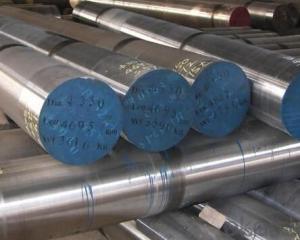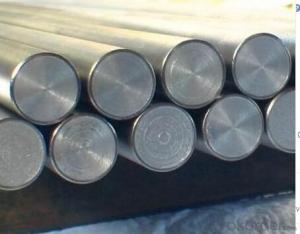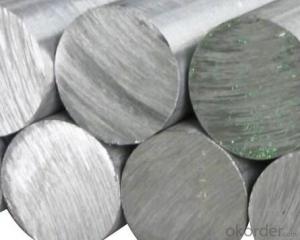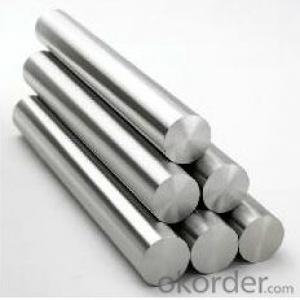Stainless Bearing Steel Round Bar
- Loading Port:
- China Main Port
- Payment Terms:
- TT or LC
- Min Order Qty:
- 50 m.t.
- Supply Capability:
- 1000 m.t./month
OKorder Service Pledge
OKorder Financial Service
You Might Also Like
Product Description:
OKorder is offering Stainless Bearing Steel Round at great prices with worldwide shipping. Our supplier is a world-class manufacturer of steel, with our products utilized the world over. OKorder annually supplies products to European, North American and Asian markets. We provide quotations within 24 hours of receiving an inquiry and guarantee competitive prices.
Product Applications:
Stainless Bearing Steel Round are ideal for structural applications and are widely used in the construction of buildings and bridges, and the manufacturing, petrochemical, and transportation industries.
Product Advantages:
OKorder's Stainless Bearing Steel Round are durable, strong, and resist corrosion.
Main Product Features:
· Premium quality
· Prompt delivery & seaworthy packing (30 days after receiving deposit)
· Corrosion resistance
· Can be recycled and reused
· Mill test certification
· Professional Service
· Competitive pricing
Specifications of Bearing Steel Round Bar
Grade | AISI 52100, ASTM E52100, DIN 1.3505,JIS SUJ2, GCr15 |
Dimensions | Diameter: 30-60mm Length: 2000-13000mm or as required |
Shape | Round Bar |
Type | Alloy Steel Bar |
Delivery Condition | Black Surface |
Material | Bearing Steel |
Technique | Hot Rolled |
Usage and Applications of Bearing Steel Round Bar
Bearing steels are used for ball and roller bearing applications and are comprised of low carbon steels and high carbon through harden able steel.
First the famous 1C-1.5Cr steel from which the majority of bearings are made. Its structure is apparently well-understood and the focus is on purity in order to avoid inclusions which initiate fatigue during rolling contact. Then there is the M50 steel and its variants, from which bearings which serve at slightly higher temperatures in aeroengines are manufactured, based on secondary-hardened martensite.
Tapered roller bearing are generally used to support combined load mainly consisting of radial load. Their cups are separable for easy assembling ,During mounting and using, radial clearance and axial clearance can be adjusted and preloaded mounting can be made.
Packaging & Delivery of Bearing Steel Round Bar
Packaging Detail: ASTM 52100 Steel in seaworthy packing or on customer request; Packed in bundles with standard export sea-worthy package or as customer require
Delivery Detail: 45 days after confirmed
Trade terms: FOB, CFR, CIF ou as customer's required
MOQ: 25 tons or at customer's demands. If the quantity is good, the price will be better.
Processing of Bearing Steel Round Bar
The processing of Bearing Steel Round Bar is hot rolled (strictly control sulphur, phosphorus and non-metallic inclusions content and distribution)
Chemical Composition of Bearing Steel Round Bar
C | Si | Mn | Cr | Ni | Cu |
Equal or less than | |||||
0.95-1.05 | 0.15-0.35 | 0.25-0.45 | Cr:1.40-1.65 | 0.30 | 0.25 |
All products' chemical composition and specification can be design according to customers' requirement.
Note of Bearing Steel Round Bar
1. According to national standard (GB) for our products, if not, supply according to national standards (GB) or agreement.
2. We can not only provide electric furnace +LF+VD and electros lag re-melting (ESR) steel forging materials, but also forging products of piece, bar, etc.
3. Our company is equipped with roll equipment and can provide our customers with roll billets or finished.
4. Please send us your detailed specifications when inquire. We will reply to you ASAP.
5. Certificate of quality is issued in English, in addition the normal terms, production process, the mechanical property (yield strength, tensile strength, elongation and hardness. forged ratio, UT test result, Grain size, heat treatment methods and the sample of is shown on the certificate of quality.
FAQ:
Q1: Why buy Materials & Equipment from OKorder.com?
A1: All products offered byOKorder.com are carefully selected from China's most reliable manufacturing enterprises. Through its ISO certifications, OKorder.com adheres to the highest standards and a commitment to supply chain safety and customer satisfaction.
Q4: What makes stainless steel stainless?
A4: Stainless steel must contain at least 10.5 % chromium. It is this element that reacts with the oxygen in the air to form a complex chrome-oxide surface layer that is invisible but strong enough to prevent further oxygen from "staining" (rusting) the surface. Higher levels of chromium and the addition of other alloying elements such as nickel and molybdenum enhance this surface layer and improve the corrosion resistance of the stainless material.
Q5: Can stainless steel rust?
A5: Stainless does not "rust" as you think of regular steel rusting with a red oxide on the surface that flakes off. If you see red rust it is probably due to some iron particles that have contaminated the surface of the stainless steel and it is these iron particles that are rusting. Look at the source of the rusting and see if you can remove it from the surface.
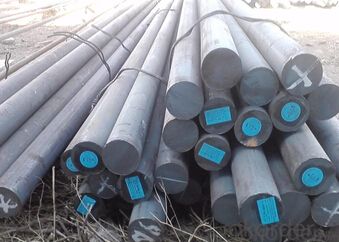
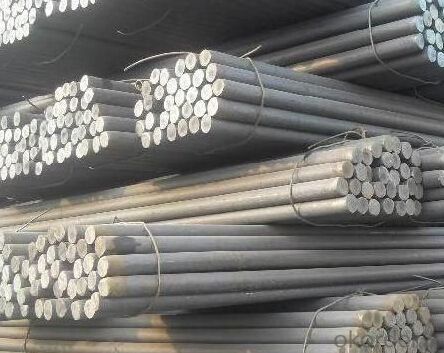
- Q:Can special steel be used in cryogenic applications?
- Indeed, cryogenic applications can utilize special steel. In particular, austenitic stainless steels like 304 or 316 are frequently employed in cryogenic settings because of their remarkable mechanical attributes and ability to withstand low temperatures. These steels maintain their strength, toughness, and ductility even in exceedingly cold environments, rendering them suitable for cryogenic use. Furthermore, special steels also exhibit commendable resistance to corrosion and thermal expansion, which are crucial considerations in cryogenic applications. In summary, special steel alloys possess a distinctive combination of properties that make them highly suitable for withstanding and functioning in extremely frigid conditions.
- Q:Can special steel be used in the chemical processing equipment manufacturing industry?
- Yes, special steel can be used in the chemical processing equipment manufacturing industry. Special steel is designed to withstand extreme temperatures, corrosion, and pressure, making it an ideal material for manufacturing chemical processing equipment where these factors are prevalent. Its high strength and resistance to chemical reactions make it suitable for various applications such as reactors, storage tanks, and pipelines in the industry.
- Q:What are the different high-pressure grades of special steel?
- There exist several distinct varieties of special steel that are designed to withstand high pressures, each possessing its own unique characteristics and uses. Some frequently employed high-pressure grades of special steel encompass the following: 1. 4130 steel: This particular grade of steel is renowned for its exceptional strength, toughness, and resistance to heat. It finds considerable application in the fabrication of high-pressure tubing and components for the oil and gas industry. 2. 4340 steel: Distinguished by its extraordinary strength and toughness, this grade of steel is commonly utilized in the production of critical components like high-pressure valves, gears, and other crucial parts in industries such as aerospace, defense, and automotive. 3. 316 stainless steel: Highly resistant to corrosion and boasting excellent high-temperature properties, this stainless steel grade is frequently employed in high-pressure scenarios like pipelines, heat exchangers, and pressure vessels within the chemical and petrochemical industries. 4. 17-4 PH stainless steel: Offering a combination of high strength, superb corrosion resistance, and good toughness, this stainless steel grade often finds application in high-pressure pump components, turbine blades, and other vital parts within industries like power generation and aerospace. 5. F22 steel: Classified as a low-alloy steel with remarkable high-temperature strength and exceptional resistance to creep, this grade of steel is commonly used in high-pressure and high-temperature environments such as boilers, pressure vessels, and piping systems found in power plants and refineries. The aforementioned examples represent just a small selection of the available high-pressure grades of special steel. The appropriate grade choice is contingent upon the specific requirements of the application, encompassing factors such as pressure, temperature, corrosion resistance, and mechanical properties.
- Q:What are the main factors affecting the formability of special steel?
- Several factors influence the formability of special steel, similar to other types of steel. These factors encompass the composition, microstructure, mechanical properties, temperature, and strain rate of the steel. The composition of special steel plays a vital role in determining its formability. The presence of alloying elements, such as chromium, nickel, molybdenum, and vanadium, can significantly impact the steel's ability to be shaped. These elements have the power to modify the steel's strength, ductility, and resistance to deformation. Another crucial factor influencing the formability of special steel is its microstructure. Fine-grained steels generally exhibit superior formability compared to coarse-grained steels. Additionally, the existence of non-metallic inclusions, like sulfides and oxides, can act as stress concentrators and promote crack formation, thereby influencing formability. The mechanical properties of special steel, including yield strength, tensile strength, and elongation, directly affect its formability. Steels with higher yield strength typically pose greater difficulty in shaping as they require more force for deformation. However, steels with high elongation can undergo more significant plastic deformation before failure, making them more formable. Temperature is also a critical factor impacting the formability of special steel. Elevated temperatures enhance the steel's ductility and make it easier to shape. This is due to the reduction in yield strength and increased movement of dislocations within the crystal structure. However, excessively high temperatures can lead to grain growth, negatively impacting formability. The strain rate, which refers to the rate of deformation applied to the steel, also influences formability. Higher strain rates can result in strain hardening, making the steel stronger but less formable. Conversely, lower strain rates allow for greater plastic deformation and improved formability. In conclusion, achieving the desired formability and shaping capabilities of special steel in various applications necessitates an understanding and optimization of its composition, microstructure, mechanical properties, temperature, and strain rate.
- Q:What are the different methods of surface powder coating for special steel?
- Special steel can be coated using various surface powder coating methods. These methods include: 1. Electrostatic powder coating: By charging the powder particles and spraying them onto the steel surface, a uniform and durable coating is achieved. The charged particles are attracted to the grounded steel. 2. Fluidized bed powder coating: Preheating the steel and dipping it into a fluidized bed of powder particles results in a smooth coating. The heat causes the powder to melt and adhere to the steel surface. Excess powder is removed through shaking or blowing air. 3. Flame spray powder coating: This method involves heating the powder particles with a flame and then spraying them onto the steel surface. The melted powder solidifies to form a coating. This method is commonly used for repairing damaged coatings or larger steel structures. 4. Thermal spray powder coating: By heating and propelling the powder particles onto the steel surface using a thermal spray gun, a dense and well-adhered coating is achieved. This method is suitable for high-wear applications and corrosive environments. 5. UV-cured powder coating: Applying a UV-sensitive powder onto the steel surface and exposing it to UV light initiates a chemical reaction that results in a hard coating. UV-cured powder coating is known for its fast curing time and excellent resistance to chemicals and UV radiation. Each method has its own advantages and considerations, and the choice depends on factors such as the specific requirements of the steel surface, desired coating thickness, and production volume.
- Q:What are the environmental impacts of using special steel?
- Special steel can cause several environmental effects. To begin with, the extraction of raw materials like iron ore and coal for special steel production results in deforestation, destruction of habitats, and loss of biodiversity. This mining process also releases pollutants into the air, soil, and water, contributing to pollution. Special steel production also emits greenhouse gases, especially carbon dioxide (CO2), during manufacturing. The high temperatures required to melt and shape the steel, along with the energy-intensive processes involved, lead to significant CO2 emissions that contribute to climate change. Moreover, the transportation of special steel has its own environmental consequences. The shipping and logistics involved in transporting the steel from production facilities to end-users generate additional greenhouse gas emissions, air pollution, and fuel consumption. Additionally, the disposal of special steel products at the end of their lifecycle poses environmental challenges. If not properly recycled or disposed of, steel products can end up in landfills, taking up valuable space and potentially releasing harmful substances into the environment. Despite these environmental impacts, it is important to acknowledge that special steel is frequently used in various industries due to its durability, strength, and resistance to corrosion. Efforts are being made to mitigate these impacts by adopting cleaner production methods, such as recycling and utilizing renewable energy sources in the steel manufacturing process. Additionally, initiatives like carbon capture and storage are being explored to reduce greenhouse gas emissions from steel production. In conclusion, although special steel offers numerous benefits, it is crucial to balance these advantages with the need to minimize its environmental impacts through sustainable production and responsible disposal practices.
- Q:What are the main applications of special steel in the packaging industry?
- The main applications of special steel in the packaging industry include the manufacturing of containers, cans, and closures. Special steel offers excellent strength, durability, and corrosion resistance, making it suitable for packaging materials that need to withstand various environmental conditions and protect the contents inside. Its high tensile strength also allows for thinner and lighter packaging, reducing material usage and transportation costs. Additionally, special steel is used in machinery and equipment used for packaging processes, ensuring efficiency and reliability in the production line.
- Q:How does special steel contribute to the aerospace fuel efficiency?
- Special steel contributes to aerospace fuel efficiency in several ways. Firstly, special steel alloys are used in the manufacturing of aircraft engines, which are designed to be lightweight and durable. The use of these alloys helps reduce the overall weight of the engine, resulting in less fuel consumption during flight. Additionally, special steel is also used in the construction of various aircraft components, such as wings and landing gear. By utilizing stronger and lighter steel materials, the overall weight of the aircraft is reduced, leading to improved fuel efficiency. Moreover, special steel's high temperature resistance properties enable it to withstand the extreme heat generated by engines, allowing for more efficient combustion and reduced energy loss. Overall, the use of special steel in aerospace applications significantly contributes to fuel efficiency by reducing weight, improving durability, and optimizing engine performance.
- Q:How does special steel contribute to improving product reliability?
- Special steel contributes to improving product reliability in several ways. Firstly, special steel is known for its exceptional strength and durability, which enhances the overall performance and lifespan of various products. It can withstand heavy loads, resist wear and tear, and maintain its structural integrity even under extreme conditions. Secondly, special steels often possess excellent corrosion resistance properties, preventing rust and deterioration over time. This is particularly crucial for products exposed to moisture or harsh environments. Additionally, special steel allows for precise manufacturing and provides consistent material properties, ensuring the quality and reliability of the final product. By utilizing special steel, manufacturers can enhance the reliability of their products, offering customers a longer lifespan, reduced maintenance requirements, and increased safety and performance.
- Q:What are the main applications of special steel in the marine sector?
- Special steel is widely used in the marine sector for various applications. Some of the main applications include shipbuilding, offshore oil and gas exploration, and marine equipment manufacturing. Special steel is used to construct the hulls and superstructures of ships, as well as various components such as propellers, shafts, and rudders. Its high strength, durability, and corrosion resistance make it ideal for withstanding the harsh conditions of the marine environment. Additionally, special steel is also used in the construction of offshore platforms, pipelines, and underwater structures, as it can withstand extreme pressures and resist corrosion caused by saltwater.
1. Manufacturer Overview |
|
|---|---|
| Location | |
| Year Established | |
| Annual Output Value | |
| Main Markets | |
| Company Certifications | |
2. Manufacturer Certificates |
|
|---|---|
| a) Certification Name | |
| Range | |
| Reference | |
| Validity Period | |
3. Manufacturer Capability |
|
|---|---|
| a)Trade Capacity | |
| Nearest Port | |
| Export Percentage | |
| No.of Employees in Trade Department | |
| Language Spoken: | |
| b)Factory Information | |
| Factory Size: | |
| No. of Production Lines | |
| Contract Manufacturing | |
| Product Price Range | |
Send your message to us
Stainless Bearing Steel Round Bar
- Loading Port:
- China Main Port
- Payment Terms:
- TT or LC
- Min Order Qty:
- 50 m.t.
- Supply Capability:
- 1000 m.t./month
OKorder Service Pledge
OKorder Financial Service
Similar products
New products
Hot products
Related keywords
